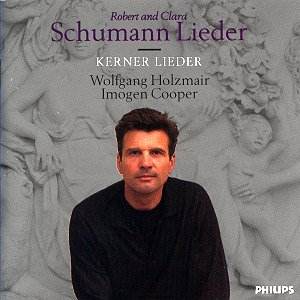Imogen Cooper, in recent concerts at the Wigmore Hall
in London, proved once more her innate sensibility and musicianship.
She displayed a natural affinity for the Romantic and individual sound-world
of Robert Schumann (see reviews on Seen & Heard), and this impression
is more than confirmed by her playing in the present issue.
The baritone Wolfgang Holzmair had, however, left me
cold in a concert performance of Schubert's 'Die schone Mullerin' some
time ago at the Queen Elizabeth Hall. His Schumann family interpretations
in this recorded recital came as a pleasant surprise, therefore: his
diction is particularly worthy of mention (it is consistently clear),
and if he fails to get inside the music to the same depths as his accompanist
does, this remains a fascinating and rewarding disc.
The Kerner-Lieder ('Liederreihe'), Op. 35 date from
1840, Schumann's miraculous year of song. As a recording, Op. 35 exemplifies
the disc as a whole. Cooper's seamless legato in the second song, 'Stirb,
Lieb' und Freud!', her carefully weighted chording in song ten, 'Stille
Tranen' and her unfailing realization of harmonic direction all enchant
the listener. Holzmair at his best is touching, but song 9, 'Frage',
exemplifies his tendency to sit on the surface of these lieder: almost
every line of Kerner's original ends with an exclamation mark, something
you would never guess from just listening. Of the twelve Lieder, the
penultimate 'Wer machte dich so krank?' is perhaps the most effective,
evoking a quiet tension and a disturbing stillness in response to the
text. Of modern recordings, this performance should sit alongside Keenleyside
and Johnson on Hyperion CDJ33102.
The compositional weaknesses of the first song on the
disc by Clara, 'Die stille Lotosblüme', Op. 13 No. 6, are perhaps
emphasized by its juxtaposition with such a substantial chunk of Robert's
music. The piano accompaniment comes across as a trifle unimaginative
in comparison: if there is an insistently repeated rhythmic figure,
the searching harmonic imagination of her husband seems to be what is
required. The song, 'O Lust, o Lust', Op. 23 No. 6 provides some recompense,
acting also as a reminder of Clara's stature as a pianist.
The subsequent interlacing of lieder by man and wife
works beautifully, however. Tempi are always carefully chosen and there
are some truly impressive moments: listen to Cooper's way with the quasi-improvisatory
opening of Clara's Op. 23 No. 2, or Cooper's intimate web of sound in
Robert's famous 'Der Nussbaum', Op. 25 No. 5.
In keeping with the carefully considered aura of the
disc, it is Robert's appropriately titled 'Zum Schluss', Op. 25 No.
6, which forms a thought-provoking, haunting end to a stimulating disc.
As a programme, this is release provides a fascinating
experience and forms a worthy continuation of the Holzmair/Cooper partnership.
Colin Clarke


